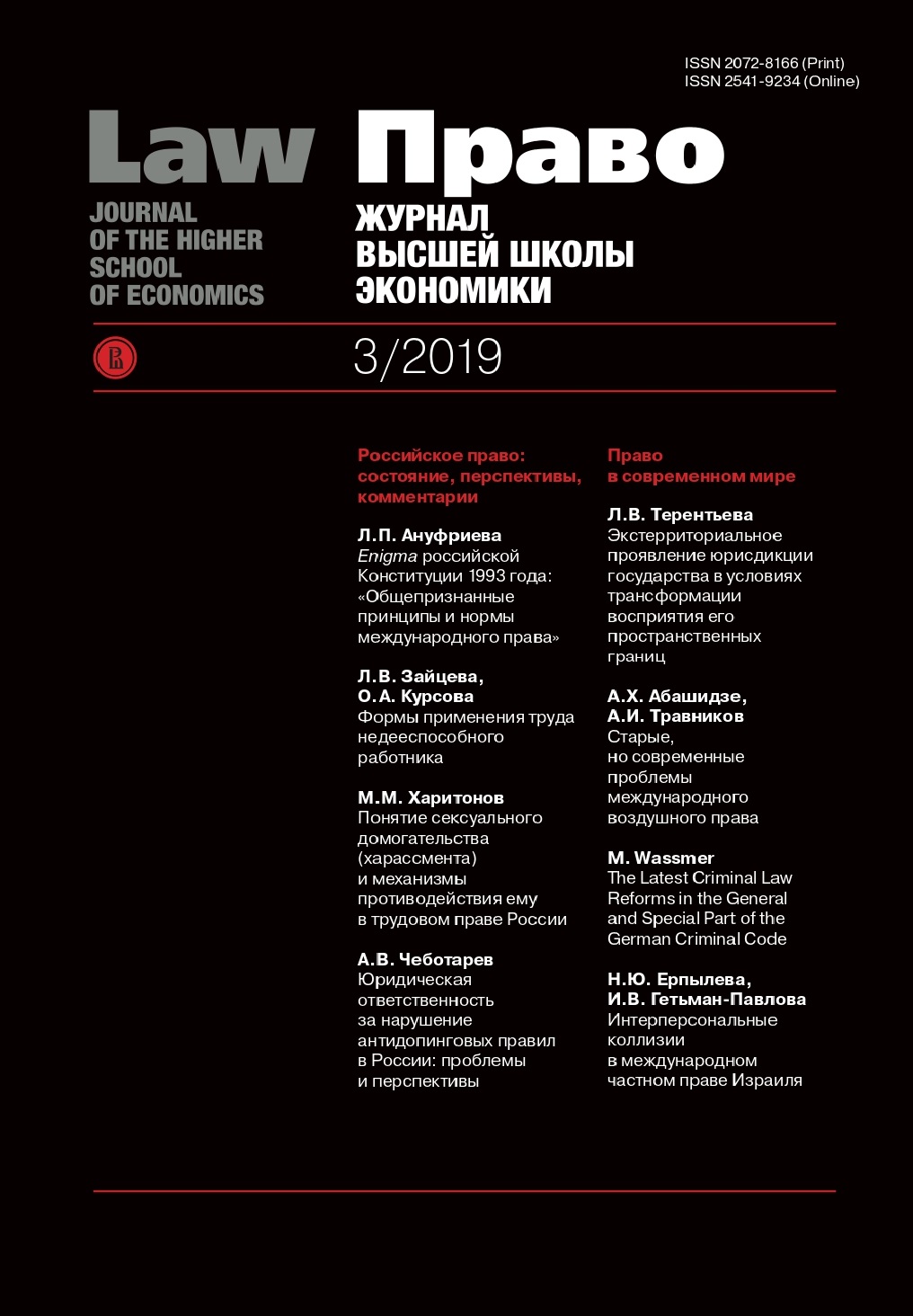Понятие сексуального домогательства (харассмента) и механизмы противодействия ему в трудовом праве России
Аннотация
Статья посвящена определению понятия «сексуальное домогательство» и оценке механизмов противодействия этому явлению в трудовых отношениях. Необходимость таких механизмов обусловлена тем, что в трудовых отношениях их инфраструктура по своей природе благоприятствует домогательству, так как жертва, как правило, находится в служебной и (или) «пространственно-временной» зависимости от нарушителя. Служебная зависимость обусловлена либо прямым административным подчинением жертвы источнику харассмента, либо тем, что он может повлиять на ее карьеру и иные блага, связанные с работой. «Пространственно-временная» зависимость обусловлена тем, что жертва не может избежать контакта с источником харассмента, изменив свое местонахождение или время нахождения, поскольку в силу своих трудовых обязанностей она должна находиться в данном месте в данное время. Автором рассмотрены определения поведения домогательства и предложены четыре типа возможных форм проявления домогательств: нападение, принуждение, использование и демонстрация; рассмотрена обобщенная практика США по квалификации поведения как харассмента и проанализированы нормы российского права с точки зрения адекватности средств противодействия этой угрозе. Установлено, что действующее уголовное, гражданское, административное и трудовое законодательство не содержит эффективных методов защиты от большинства форм домогательств. Предложены стимулы нормативного характера для более активного вовлечения работодателя в противодействие харассменту в рамках трудовых отношений (например, возможность отстранить нарушителя от работы, перевести его на другую работу, уволить за домогательство как грубый дисциплинарный проступок) и нормативные механизмы защиты жертвы харассмента с помощью средств трудового права: обязанность работодателя предоставить отпуск по заявлению жертвы, перевод ее на другую работу; право жертвы домогательства не являться на работу с сохранением среднего заработка за время отсутствия, если работодатель не принимает мер для защиты жертвы от домогательств.
Литература
Arzamastsev M.V. (2018) Comparative legal review of foreign models of criminalization of deviant forms of sexual behavior. Zhurnal zarubezhnogo zakonodatelstva i sravnitelnogo pravovedeniya, no 6, pp. 134-141 (in Russian).
Chernyaeva D.V. (2013) Legal framework for workplace mobbing and harassment prevention in Russia: problems and prospects. E-Journal of International and Comparative Labour Studies, no 2, pp. 14-31.
Dyadkin O.N., Akhmedov M.N. (2018) Questions of qualification of compulsion to actions of sexual character. Vestnik Vladimirskogo yuridicheskogo instituta, no 3, pp. 73-77 (in Russian)
Kiselev A. (2013) Employee's right to dignity. Available at: https://shorturl.at/cztGo (in Russian)
Kursova O.A. (2016) Professional risk assessment and management system: problems of legal regulation. Lex Russica, no 10, pp. 182-191 (in Russian)
Maleina M.N. (2018) Immoral misconduct of the teacher: legal assessment of the concept and consequences in the field of labor and civil law. Zhurnal rossiyskogo prava, no 10, pp. 61-72 (in Russian)
Ofman E.M. (2011) Application of the comparative method in labour law. Trudovoye pravo v Rossii i za rubezhom, no 2, pp. 7-10 (in Russian)
Osipova O.S. (2012) The relationship between organizational culture and the phenomenon of harassment. Chelovecheskiy capital, no 12, pp. 28-30 (in Russian)
Rasskazov N.Yu. (ed.) (2013) Model rules of European private law. Moscow: Statut, 989 p. (in Russian)
Seregina L.V. (2015) Conceptual approaches to labor protection in the Russian Federation. Zhurnal rossiyskogo prava, no 11, pp. 95-106 (in Russian)
Schneider K., Swan S., Fitzgerald L. (1997) Job-related and psychological effects of sexual harassment in the workplace: Empirical evidence from two organizations. Journal of Applied Psychology, no 3, pp. 401-415.
Stuchevskaya O.I. (2008) Harassment and Russian women. Vestnik obshchestvennogo mneniya, no 4, pp. 43-49 (in Russian)
Veklenko S.V., Stulov A.V. (2019) Is there a need for criminal punishment for sexual harassment? Vestnik Kaliningradskogo filiala Sankt-Peterburgskogo universiteta MVD Rossii, no 1, pp. 11-16 (in Russian)
Wall E. (1991) The Definition of Sexual Harassment. Public Affairs Quarterly, no 4, pp. 371385.
Zaripov Z.S., Musatova E.E. (2010) Some aspects of criminological characteristics of sexual harassment against women. Kriminologiya: vchera, segodnya, zavtra, no 1, pp. 153-162 (in Russian)
Copyright (c) 2019 Право. Журнал Высшей школы экономики

Это произведение доступно по лицензии Creative Commons «Attribution-ShareAlike» («Атрибуция — На тех же условиях») 4.0 Всемирная.


















